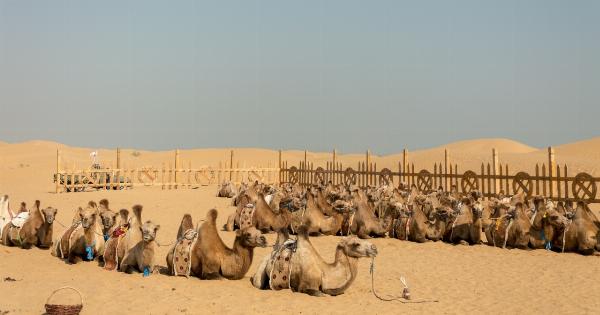When people think of camels, they might picture them in the desert, with their humps full of water and their unique ability to go without food and water for a long period of time.
However, these interesting animals have recently been linked to a deadly illness called Middle East Respiratory Syndrome (MERS).
What Is MERS?
MERS is a respiratory illness caused by a virus known as MERS-CoV. It was first identified in the Middle East in 2012 and has since spread to other parts of the world.
According to the World Health Organization (WHO), the virus has resulted in over 2,500 confirmed cases of infection in over 27 countries, with a mortality rate of about 35%. The symptoms of MERS include fever, cough, and shortness of breath, and in severe cases, it can lead to pneumonia, kidney failure, and death.
How Are Camels Involved?
Scientists have discovered that camels in the Middle East are likely responsible for the spread of MERS to humans.
According to the WHO, about 75% of all human cases of MERS are linked to close contact with camels or consumption of camel products such as milk or meat. The virus has been found in the nasal secretions, saliva, and urine of camels, and it is possible that people can become infected by coming into contact with these bodily fluids.
Why Are Camels Susceptible to MERS?
Camels have a unique immune system that allows them to survive and thrive in the harsh desert environment. This same immune system, however, might make them more susceptible to certain viruses.
Researchers have suggested that the MERS virus may have originated in bats and then jumped to camels, where it evolved to become better adapted to living in a mammal host. It is possible that the virus has also evolved to become better adapted to human hosts, which has resulted in the current outbreak.
What is Being Done to Prevent the Spread of MERS?
As of now, there is no specific treatment or vaccine for MERS, which makes prevention the best approach to managing the disease.
Public health officials in affected countries have recommended simple measures such as washing hands thoroughly, covering the mouth when coughing or sneezing, and avoiding close contact with camels. In addition, many countries have banned the importation of camels from MERS-affected areas.
The Implications of the Camel Connection
The link between camels and the spread of MERS highlights the importance of understanding the interactions between people, animals, and the environment.
It also underscores the need for collaboration between human and animal health professionals to prevent and control emerging diseases. In the case of MERS, understanding the role of camels in the spread of the disease is crucial for implementing effective control measures.
The Bottom Line
MERS is a serious respiratory illness that has been linked to camels in the Middle East. While there is no specific treatment or vaccine for the disease, public health officials recommend simple measures to prevent its spread.
Understanding the links between people, animals, and the environment is crucial for preventing the emergence and spread of diseases like MERS.































